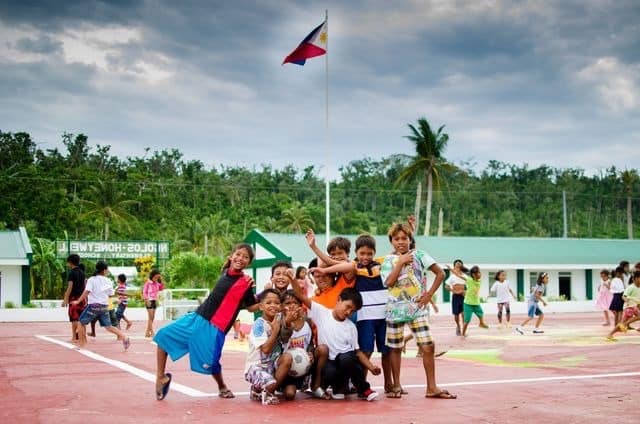(Credit: UNICEF)
SUMMARY
To prevent national budgets from draining unexpectedly due to natural disasters, the Philippines is boosting the resilience of micro, small and medium enterprises (MSMEs).
The Philippines Chamber of Commerce and Industry (PCCI) is partnering with the National MSME Resilience Core Group to support disaster-resilient social enterprises and MSMEs through strategic capacity-building, risk financing and knowledge sharing. The project offers a roadmap for public and private sectors to take actionable next steps.
BACKGROUND
Micro, small and medium enterprises (MSMEs) constitute the backbone of the Philippines economy as substantial contributors to the GDP and as a critical source of employment. It serves the supply chain for large private corporations which depend on it. However, its business continuity risks sudden and abrupt disruption amidst looming threats of an impending disaster. The most affected MSMEs belong to key industrial sectors – retail, manufacturing, tourism, agriculture, and fishing.
The Global Climate Index 2020 ranks the Philippines as one of the most vulnerable nations to erratic climatic conditions. Intensified flooding, landslides, wind damage, drought and coastal erosion in highly populated areas have increased the risk of doing business in the market. This has led to prominent private sector stakeholders, such as the Philippine Disaster Risk Network (PDRF) and the Ayala Group, to mobilise post-disaster relief measures and infrastructure building efforts. The Jollibee Foundation also secures sustainable livelihoods for farming communities by promoting rural development and providing post-disaster relief. CARE Philippines is also devising early warning systems in its projects.
Nevertheless, to enhance disaster resilience at national and local levels, active public-private partnerships are needed to develop joint disaster-preparedness actions.
The National MSME Roadmap on Disaster Resilience 2019-2021, signed on 18 July 2019, builds the much-needed traction to improve disaster resilience for MSMEs. Complementing the initiative was the launch of the MSME disaster resilience guidebook, “Katatagan in a Box” – the first of its kind on disaster preparedness and a mobile-based application app on business continuity concepts and practices for easy accessibility by SMEs.
The Roadmap capitalizes on the key findings of the SME Resilience Survey conducted in 2017 by the iPrepare Business Facility[1] under the Strengthening MSME Disaster Resilience Project in the Philippines. It highlights the need for more coordinated initiatives in SME development and disaster risk reduction and management (DRRM) by local and national government groups and DRRM agencies, along with the private sector. The Roadmap draws out the following themes which are further distilled into actionable programmes through various public-private partnerships:
- Engaging local business owners and communities in risk-mapping and disaster risk assessments to provide relevant recommendations, advisories and contingencies
- Providing MSMEs with easier access to hazards and disaster risk data through provincial SMED Councils, local government units, and Negosyo Centers
- Incorporating Disaster Risk Resilience (DRR) and Business Continuity Management (BCM) training for MSMEs through government business training institutions
- Developing tailored risk financing tools for MSMEs, such as requiring businesses to insure employees from natural hazard risks and income loss due to disasters and promoting micro-insurance for MSMEs at the municipal level
- Including MSMEs in DRRM and CCA (climate change adaptation) policies and local development planning
With the Philippines being a key proponent of social entrepreneurship within Southeast Asia, this roadmap holds great potential as a poverty reduction strategy in the long run.
CONNECT
Follow vibrant discussions around climate financing and climate-smart solutions in the region with the AVPN community at our signature Southeast Asia Summit 2020 taking place this February in Bali, Indonesia.
LEARN
- Read more about the National MSME Roadmap on Disaster Resilience
- Learn how policy can be better translated into action in the Philippines
- Stay updated on news, progress, and insights on climate action developments around the region through the AVPN Climate Action Platform
- See how other large private sector players are empowering MSMEs in Southeast Asia.
LEAD
Find out about and engage with social purpose organisations that are supporting disaster-readiness and resilience in vulnerable communities. View deals on climate action here.
[1] “The iPrepare Business facility engaging the private sector in Disaster Risk Management is a joint initiative by the Asian Disaster Preparedness Center (ADPC), the Asian Development Bank (ADB) through the Integrated Disaster Risk Management (IDRM) Fund and Deutsche Gesellschaft für Internationale Zusammenarbeit (GIZ) GmbH within the framework of the Global Initiative on Disaster Risk Management (GIDRM).”

















